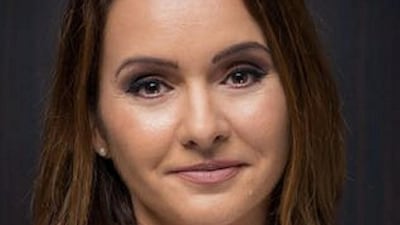The performance coach Sophia Fromell has a client who always makes a point of putting his children to bed.
Except, recently, the routine changed.
“Now he has his BlackBerry hidden under his leg and he secretly checks his messages while reading a bedtime story, which is not healthy. It adds to the pressures,” says Ms Fromell, an executive coach specialising in career coaching, corporate management and change management who is based in Dubai.
“I see with my clients, that even people who are not directly into banking or oil, they see the change in the market and feel more insecure about their jobs.”
Ms Fromell suspects that budgetary pressures are leading to people being asked to do more with less.
“[They are saying] we can’t give you the additional head count, or we can’t give you the pay rise you want.”
She adds that many companies are also cutting employee engagement programmes, fuelling job insecurity.
And to make matters worse, other workplace wellbeing initiatives are also being scaled down.
“I think generally companies’ budgets are quite tight, so [this is affecting the] kind of thing that might lead to wellness and engagement, maybe wellness programmes and benefits that they would give their staff,” says Tim Garrett, the founder of the Corporate Wellness Company in Dubai.
“As a company we have been quite successful in finding quite a lot of customers and growing our business, but I think that is just down to us trying hard.”
Experts say such moves are impacting engagement levels in the workplace, which have declined in the UAE in recent years, according to a study.
Gallup’s State of the Global Workplace report, which was released last week, revealed that just 16 per cent of UAE employees are actively engaged, which was slightly higher than the global average of 15 per cent, but significantly less than the 26 per cent of actively engaged respondents in the same study three years ago.
“Usually the number of the percentage engaged tends to be influenced by factors which have to do with everyday people management. So maybe [companies are] taking their eye off the ball a bit in terms of how people are managed on a regular basis and performance management types of issues,” says Jim Harter, the chief scientist of workplace management and wellbeing for Gallup's workplace management practice.
_______________
Read more:
Seven surefire signs you are ready for a career change
More UAE companies offering mental health support for employees
Empowering Saudi women can bring huge economic benefit
_______________
“There were some age differences. The baby-boomer age range tended to be more engaged than the millennial generation, so the younger workers are less engaged than the older workers. That pattern isn’t always the same in every part of the world, so there might be something in that explains some of it. For example, if you go to some of the former Soviet countries, you tend to get higher engagement among some of the younger workers. In the US we see that the younger workers are more in that middle category, a bit more indifferent in terms of their workplace.”
However, in better news, the Gallup report found that the UAE came out on top globally for the percentage of people in employment.
“Close to one-third of working-age adults around the world work full time (at least 30 hours per week) for an employer - our definition of a good job. More specifically, 32 per cent of residents aged 23 to 651 across the 155 countries surveyed for Gallup World Polls conducted from 2014 to 2016 fall into this category,” says the report.
“At the country level, the good jobs rate ranges from 5 per cent in Niger to 72 per cent in the United Arab Emirates,” it adds.
Gallup conducted a survey a couple of years ago about what led to happiness in the workforce in the UAE. Four factors were found to be significant.
“Engagement is certainly an important factor. We also found that trust was important, so feeling a sense of security and confidence in one’s leadership. And positivity was important, so a sense of optimism around the mission or purpose of the organisation and opportunity to focus on your strengths,” says Mr Harter.
“Interestingly we found that perceptions of the manager were even more important than perceptions about themselves.”
In fact, research by Gallup shows that managers are responsible for at least 70 per cent of the variance in their employees’ levels of engagement.
So how do managers reverse the trend, and increase employee engagement?
“From an engagement standpoint, some of the things that stuck out were that if people feel their opinions count at work they are five times more likely to be thriving in their own lives,” says Mr Harter.
“So the work piece connects to the rest of the life piece in a pretty strong way. And they are four times more likely to be thriving in their own life if the mission or purpose of the company makes them feel their job is important.”
Other important factors include recognition. People who received recognition for doing good work were found to be four times more likely to be thriving in their overall lives.
Employees also want to have some clarity in terms of what their role is. They want to be in a job where they can use their strengths on a regular basis. And they want to be recognised for it, he adds.
Repeated studies have shown the wellbeing programmes also increase engagement in the workplace.
Mr Garrett agrees. “Absolutely, because literally every single company I have ever worked for, they do it from a place of true meaning very ethically,” he says.
“They really want to help their staff live a better quality of life. it’s not really about improving performance, but they know that will happen.”


